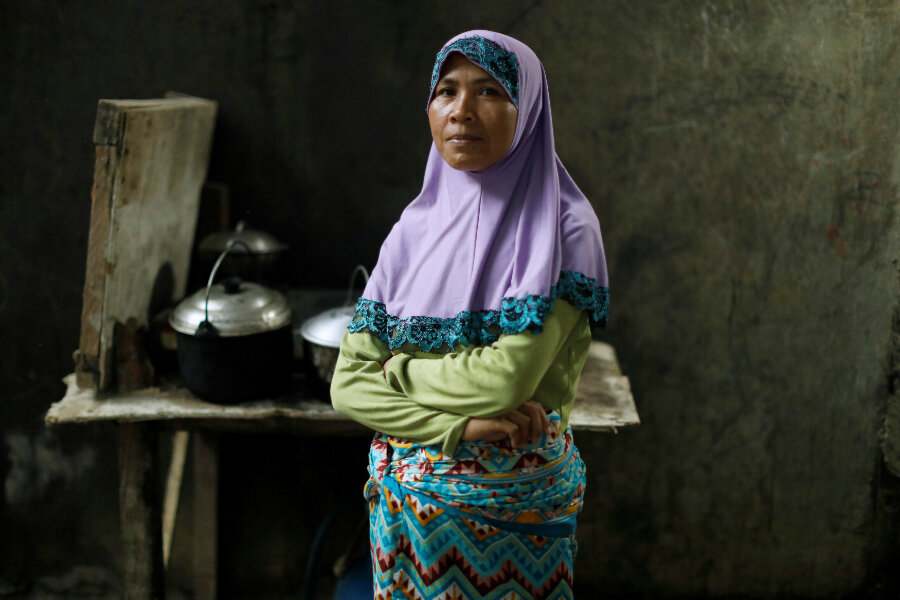Five weeks after ISIS captured town, residents forced to serve, marry, and fight for militants
Loading...
| Marawi City, Philippines
Civilians held hostage by Islamist militants occupying a southern Philippine city have been forced to loot homes, take up arms against government troops, and serve as sex slaves for rebel fighters, the Army said on Tuesday.
Citing accounts of seven residents of Marawi City who either escaped or were rescued, the military said some hostages were forced to convert to Islam, carry wounded fighters to mosques, and marry militants of the Maute group loyal to the Islamic State.
"This is what is happening inside, this is very evident," military spokesman Jo-Ar Herrera told a news conference. "These are evil personalities."
Their accounts, which could not be immediately verified, are the latest harrowing accounts to come out of a conflict zone that the military has been unable to clear for five weeks, as well-armed and organized rebels fight off soldiers with sniper rifles and rocket-propelled grenades.
Some escapees say bodies of residents have been left in the streets, some for weeks, and civilians are distressed by government air strikes and artillery bombardments that have reduced parts of Marawi to rubble.
The protracted seizure has worried the region about the extent the Islamic State's agenda may have gained traction in the southern Philippines, which is more used to banditry, piracy, and separatism than radical Islam.
The rebels' combat capability, access to heavy weapons, and use of foreign fighters have raised fears in the mainly Catholic country that the Marawi battle could just be the start of a wider campaign, and it could be presented by Maute as a triumph to aid their recruitment.
President Rodrigo Duterte, reappearing in public after a week-long absence, said he was deeply saddened by the crisis and promised Marawi would be rebuilt.
He said he had cousins who were members of the Maute group, one of which had been killed, and his decision to declare martial law on Mindanao was justified because he was aware of exactly what the extremists would do.
"I know the deployment of snipers and where they hid their firearms. I already had the complete picture and I knew that would be a long fight," he said in a speech.
Mr. Duterte said he understood why Muslim separatists had fought the government, but could not comprehend Islamic State's radical doctrine.
"What's painful for me, a fractured ideology entered. All that they want is to kill and destroy, how can we live with that?" he said.
Heavy clashes broke out on Tuesday as the battle entered its sixth week, with intense bombings by planes on a shrinking rebel zone.
No negotiations
The government ruled out negotiations after reports that Abdullah Maute, one of two brothers who formed the militant group carrying their name, wanted to trade a Catholic priest hostage for his parents arrested this month.
The military said on Saturday Mr. Maute had fled.
Taking advantage of a short truce to mark the Eid al-Fitr Islamic holiday, eight Muslim leaders met briefly on Sunday with Maute. The Philippine Daily Inquirer said he had asked for his father, Cayamora Maute, and influential businesswoman mother, Farhana Maute, to be freed, in a swap for Father Teresito "Chito" Soganub.
But presidential spokesman Ernesto Abella said deals with militants were against government policy, and anyone trying to bargain had no authority to do so.
The military's public relations machine has been insisting that the rebel leadership was crumbling, saying top commanders had escaped or were killed in action, and the group was fraught with infighting. Military officers, however, accept they lack solid proof.
The Army said there were reported sightings of the departure from the battle of Isnilon Hapilon, Islamic State's anointed Southeast Asian "emir," which Mr. Abella said showed he was not committed to his cause.
"It would be a clear sign of his cowardice," he said. "It may only be a matter of time before they disintegrate."
Fighting has raged in the town since an operation to arrest Mr. Hapilon went wrong on May 23, leading to the government losing not just Hapilon, but control of Marawi.
Official figures show 70 servicemen, 27 civilians, and 290 militants have since been killed and 246,000 people displaced.
Duterte said seeing Marawi bombed was too much to bear.
"Do not think I am enjoying my life now," he said. "I do not watch TV anymore, I turn it off or I transfer to cartoons."







